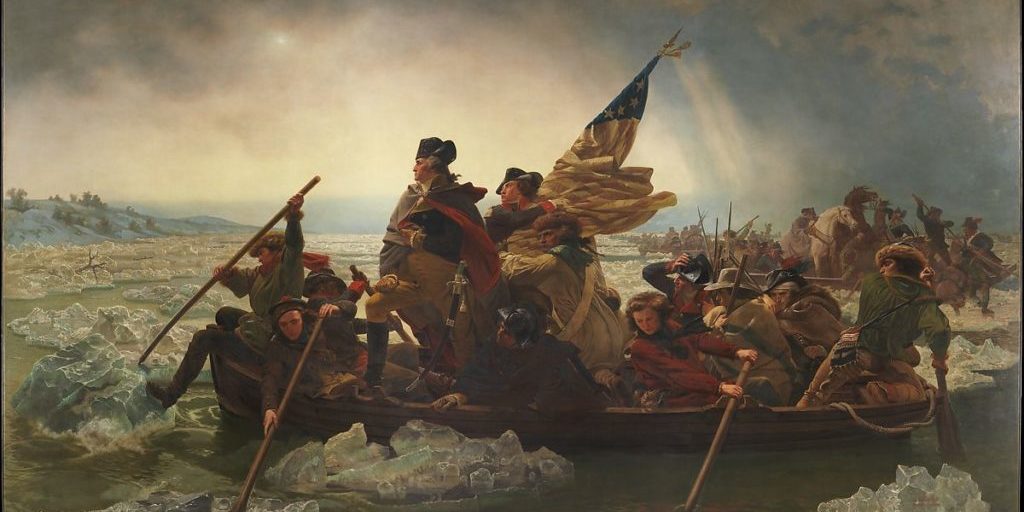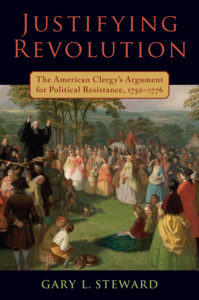
10 Questions on the American Revolution with Gary Steward
We cannot faithfully reflect on the 4th of July without pondering the providential implications that the adoption of the Declaration of Independence had on the history of the world. Adopted on July 4, 1776, the Declaration declared the original colonies to be free from British rule, giving legitimacy to the rising Revolution. For some, the Declaration was an act of treason and was morally reprehensible. Yet for others, the Declaration was not only morally justified, but it was also necessary if Christianity was to flourish in the New World.
In his new book, J ustifying Revolution: The American Clergy’s Argument for Political Resistance, 1750–1776 (OUP, 2021), Gary L. Steward answers the question of why so many American clergymen found it morally and ethically right to support resistance to British political authority by exploring the theological background and rich Protestant history available to the American clergy as they considered political resistance and wrestled with the best course of action for them and their congregations. He argues that, rather than deviating from their inherited modes of thought, the clergy who supported resistance did so in ways that were consistent with their own theological tradition.
ustifying Revolution: The American Clergy’s Argument for Political Resistance, 1750–1776 (OUP, 2021), Gary L. Steward answers the question of why so many American clergymen found it morally and ethically right to support resistance to British political authority by exploring the theological background and rich Protestant history available to the American clergy as they considered political resistance and wrestled with the best course of action for them and their congregations. He argues that, rather than deviating from their inherited modes of thought, the clergy who supported resistance did so in ways that were consistent with their own theological tradition.
In honor of the 4th of July, we interviewed Gary Steward and asked him 10 questions:
-
Did American clergymen support political resistance to the British during the American Revolution?
Yes, the majority of them did. Many Church of England and Methodist clergymen in America did not support armed resistance to the British, but the vast majority of Baptists, Presbyterians, and Congregationalists did. The supporters of resistance came from a wide variety of theological backgrounds–some were heterodox and some were orthodox. Many clergymen who supported the Great Awakening were also supporters of political resistance and American Independence. George Whitefield supported resistance to British policies toward the American colonies like the Stamp Act before his death in 1770, while John Wesley remained a staunch Tory throughout the conflict.
-
In the eyes of the patriot clergymen, what was the American Revolution about?
The American Revolution was not about trivial matters like taxation and tea. The patriot clergy, like many Americans, came to believe that the British government had adopted an oppressive and destructive posture of political absolutism toward the colonies, akin to what had been adopted by Stuart monarchs in the seventeenth century. (In 1766 the British government had actually passed an act in Parliament asserting that it had “a right to bind the colonies in all cases whatsoever.”) This absolutist posture threatened to illegally take away the colonists’ civil and religious liberties, and so they engaged in escalating acts of resistance: petitions, protests, boycotts, non-compliance, and finally armed resistance. After over a decade of petition and appeal, the clergy gradually supported as a last resort the taking up of arms in order to engage in a war of self-defense in protection of their lives, liberties, and property.
-
Why did so many clergy support armed resistance to the British?
The clergy felt driven to support political independence and armed resistance in response to particularly oppressive and cruel actions taken by the British. The British closure of the Boston port (1774) and the later closure and blockade of all American ports to all trade (1775) threatened to reduce these urban population centers along to the coast to destitution and starvation. After the British fired incendiary shot into three coastal civilian population centers–Charleston, Massachusetts; Falmouth, Maine; Norfolk, VA–burning them to the ground in 1775 and 1776 as an act of revenge, the clergy justified armed resistance to the British as an act of self-defense.
-
How did the patriot clergy justify political resistance in the light of Romans 13 and other passages in Scripture?
The patriot clergy did not view political resistance to one’s governing authorities as necessarily going against the teachings of the Bible. Those who supported resistance believed that the New Testament taught that believers have a general duty to submit to their governing authorities, but not an absolute duty. At times, if governing authorities became tyrannical and oppressive, then they are no longer “God’s servant for your good” (Roman 13:4), and the duty to submit is no longer binding. At times, “we must obey God rather than man” (Acts 5:29), and if usurpers and tyrants take steps to kill and harm those under them, then political resistance can at times become one’s duty. These clergy believed that multiple places in the Old Testament supported the idea of principled, godly resistance as well, such as Gideon’s resistance to the Philistines, Ehud’s assassination of Eglon (Judges 3), and Jehu’s overthrow of wicked kings like Ahaziah and Joram (2 Kings 9–10).
-
Was the patriot clergy’s support of political resistance something new in the history of the church?
No, I don’t think so. The patriot clergy in America certainly did not view their resistance to the British as something new. They saw themselves in a long line of British Protestants who had resisted and at times overthrown their political rulers that were oppressive or aligned with the forces of oppression and persecution (e.g., Roman Catholicism). British Puritans had resisted Charles I, gone to war against him, and executed him during the English Civil War in 1649. Many prominent Puritan clergymen and theologians had supported this. Also, the British Parliament had deposed James II and forced him into exile during the Glorious Revolution in 1688. Encouraged by this, New England clergymen had organized resistance to James II’s royal governor Edmund Andros in 1689, imprisoning him and then sending back to England. A pamphlet entitled Revolution in New England Justified, most likely written by a clergyman, had appeared from a Boston printing press in 1691, providing an ethical rationale for the orderly, principled acts of resistance taken by the community against Governor Andros. This pamphlet would be reprinted in Boston in 1774, keeping the memory of principled resistance alive in the memory of the colonists.
-
Was the American Revolution motivated by the same Enlightenment ideology that motivated the French Revolution?
No. The French Revolution was secular, humanistic, and fundamentally destructive in nature. The American Revolution, on the other hand, was motivated from a desire to conserve, protect, and defend traditional British rights and liberties. It was a fundamentally conservative event and is best considered as a war for independence rather than a “revolution” in the modern sense of the word. The real revolutionaries in the conflict were Lord Grenville, Lord Townsend, Lord North, and George III, who ignored precedent, tradition, and custom as it related to colonial policies. While some individuals like Thomas Paine argued for independence on humanistic and anti-monarchical principles, clergymen like John Witherspoon explicitly rejected Paine humanism and anti-biblical notions of “the rights of men.”
-
Were the civil leaders of the American Revolution orthodox Christians?
Some were and some weren’t. Thomas Jefferson, Benjamin Franklin, and John Adams were not. George Washington is harder to pin down. Patrick Henry, Samuel Adams, John Witherspoon, John Jay, Roger Sherman, and Elias Boudinot definitely were orthodox Christians, and they supported political resistance to the British alongside of their deeply-held evangelical faith.
-
You wrote Justifying Revolution to help us understand the patriot clergy’s involvement with the American Revolution. Why is this important?
We need help from the past to navigate the times that we live in. The issue of political resistance will continue to be a pressing one if governments adopt absolutist postures over the consciences of individuals and over religious gatherings, etc. Furthermore, it’s difficult to be a patriotic American if you think that the United States was founded upon ungodly rebellion and sinful political resistance!
-
In your research for Justifying Revolution, what surprised you the most?
I was surprised to learn just how many British clergymen supported the American’s resistance to British policies. Caleb Evans, James Murray, and Thomas Bradbury were just a few of the British ministers who stood with the Americans and were strongly opposed to the measures taken against the colonies. In general, the American clergy’s arguments for political resistance were not distinctly American. They were actually quite British! Many in England argued that loyalty to the current Hanoverians line of monarchs demanded that one believe in the legitimacy of political resistance, since the Hanoverians came into power as a result of the overthrow of James II.
-
How should we celebrate the fourth of July today?
I think it should be celebrated as John Adams said in 1776, “with Pomp and Parade, with Shows, Games, Sports, Guns, Bells, Bonfires and Illuminations from one End of this Continent to the other from this Time forward forever more.”

